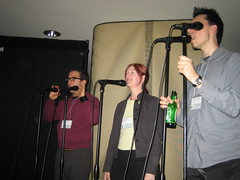...While watching the view, in a quiet moment, all of a sudden, we hear the most terrible screaming from inside the venue. It turns out to be Eric Zimmerman and Robin Hunicke playing the Organum. I got to try it out myself later on, when participating in McGonigal’s, Lowood's and Isbister's “Perform or Else: An Interdisciplinary Workshop on Extroverted Game Play”. Three players get to control one direction each (up-down, left-right, forward) by making sounds into the microphones.

Eric and Robin by the Organum

Screenshot, Organum. This was a large projected image.

Organum heard Robin
Perform or Else: An Interdisciplinary Workshop on Extroverted Game Play
Jane McGonigal
Department of Performance Studies, University of California
Henry Lowood
Curator for History of Science & Technology Collection, Stanford University
Katherine Isbister
Associate Professor, Dept. of Language, Literature and Communication
Quote from the abstract:
Richard Schechner, the founder of performance studies, famously said: “Playing is at the heart of performance.” We believe the inverse is true: performing is at the heart of play. In the Perform or Else workshop, we will investigate a particular kind of player performance: “extroverted game play” — gaming that is performed in front of an audience, and which is motivated by external performance goals as well as internal game play goals.
http://www.gamesconference.org/digra2005/viewabstract.php?id=317
In the workshop, when making sounds into the microphone of Organum, I realized (as I sometimes do) that I’m definitely not fond of performing (hey, most of the time I sit in a dark corner programming something that imitates feelings). In the workshop McGonigal asked the audience several absolutely hilarious questions regarding the level of extroversion and extremeness in performance. She had cards with them written down; different examples for different categories of players/performers (yes, another player-type categorization). McGonigal separated between different kinds of performers:


I enjoyed this workshop a lot. I think need to pay more attention to performance studies. The first student I ever supervised, Annika Bergström, used a performance perspective while doing her thesis. She was also the one insisting on that I couldn’t miss out on McGonigal’s workshop.
In the same workshop Katherine Isbister gave an overview of different physical games such as DDR, Donkey Kongas, Eye Toy and pervasive games. Then she must have said something really interesting about emotional contagion, since I have put a lot of marks around the term, a title: “Emotional Contagion” by Hatfield E. Cacioppo, and Rabson, and the word BUY with capitals.
I didn’t get the whole workshop, since there was so many sessions going on at the same time, so I couldn’t relax: instead I tried to go at two sessions at once; I didn’t want to miss Celia Pearce’s speech
Theory Wars: An Argument Against Arguments in the so-called Ludology/Narratology Debate
I missed out on the debate though, due to my restless running between sessions.
The full paper is available here:
http://www.gamesconference.org/digra2005/viewabstract.php?id=114